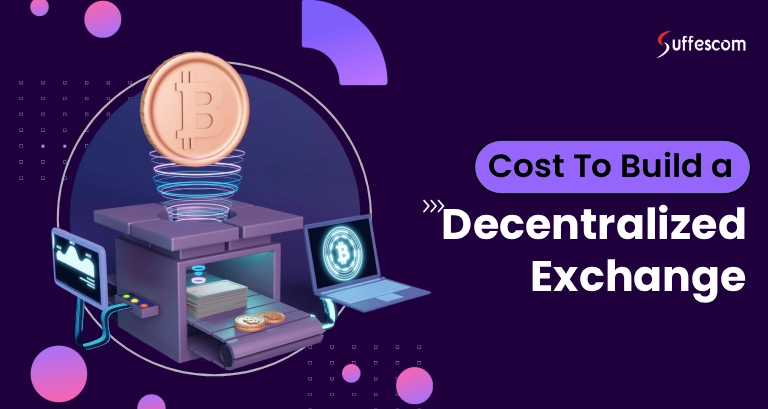DEX Development Cost in 2025: White Label vs Custom Price Breakdown

Key takeaways:
- Total DEX development costs depend on blockchain, features, security, customizations, and compliance.
- Blockchain choice affects speed, costs, and market support.
- White-label DEX costs $10,000–$20,000, while custom builds range $10,000–$30,000.
- Advanced features, smart contracts, and integrations increase both timeline and budget.
- Security and compliance are essential, raising expenses but ensuring trust.
- Each development stage including planning, design, coding, integration, security, and QA has a set share of budget.
- Backend tech like Rust costs more for speed; front-end choices affect cost and user experience.
- Upgrades, security monitoring, and marketing add ongoing costs.
- Cost-saving strategies: use open-source frameworks and outsource development.
Want similar results? → Get a Free Quote
Thinking of building your own decentralized exchange platform? One of the first things you’ll want to know is the DEX development cost. In this blog, we’ll break it down for you.
The decentralized exchange market is growing fast. Today, millions of active users are driving significant trading volumes globally, and more than half of new entrants are entrepreneurs looking to turn their DEX platforms into scalable, long-term businesses.
But with such high adoption, the competition isn’t simple, it’s intense. To stand out, you need more than just a trading app. You need a reliable, secure, and customizable DEX platform.
So, what determines the cost to develop a DEX platform? Multiple factors come into play, including the core features, security protocols, integrations, scalability options, compliance requirements, and degree of customization.
Understanding these factors helps you find the right balance of functionality and investment, ensuring you only pay for what truly drives your business goals.
Whether you’re leaning toward fully custom development or evaluating white-label DEX development price models, this guide will walk you through the technical and financial landscape. Additionally, it will help you make an informed decision and successfully launch a DEX that goes beyond the basics.
Essential Factors Affecting the Cost to Develop a DEX Platform
Three major essential factors impact the DEX development cost, and before you plan a budget, understanding these at first is crucial.
Blockchain Choice
Choosing the right blockchain to build a decentralized exchange (DEX) is like laying the foundation of a house, it directly impacts the strength and growth potential of your platform. When planning your DEX development, consider these key factors:
Network’s Speed and Scalability
Some blockchains, like Solana, are known for handling thousands of transactions per second (TPS), at present Solana functions at 3,222 TPS. This high throughput ensures smooth and fast trades, even when user demand peaks.
Network’s Cost Efficiency
Ethereum is popular but its network congestion often drives up gas fees. Alternatives like Polygon offer much lower transaction costs, appealing to businesses who want to keep their DEX platform development cost manageable.
Network’s Ecosystem and Community Support
A blockchain’s developer community and resources matter. Ethereum boasts a vast ecosystem with extensive tooling and documentation. While emerging networks such as Vector Smart Chain are rapidly growing their support base.
Selecting the right blockchain influences not only your development expenses but also your DEX’s performance and long-term viability. Understanding these factors will help you make smarter decisions about your DEX development cost and build a platform that stands out.
Custom vs. White Label DEX Solutions
Both of the development methodologies possess different cost estimation based on various factors. Let’s get a look on white-label vs custom DEX cost in detail.
| Point of Difference | White-Label DEX | Custom DEX |
| Platform’s scalability | Easy to scale with essential features as the users grow | DEX platform built from scratch as per business needs |
| Development time | Development time is shorter than the custom DEX | Requires a relatively longer development period |
| DEX’s security | Common systems and infrastructure for extensive security | Advanced and specialized features integrated using particular tech stack |
| Platform customization | Limited | Extensive |
| Cost range | $10,000 to $20,000 | $10,000 to $30,000 |
| Fit for? | Small enterprises and new startups or where cost savings is a priority | Suitable for established and high-tech businesses. |
Scope, Complexity, and Feature Set
The complexity and features of your DEX platform play a crucial role in shaping the trading engine. Naturally, the more sophisticated the platform, the greater the development effort and resources required, which pushes up the overall cost to develop a DEX platform.
Compliance management lays the groundwork for security, but it’s only part of the picture. To truly safeguard your exchange, advanced security features are essential - think fraud detection systems, strong encryption, multi-factor authentication, and more.
Undoubtedly, these additions protect your platform but also contribute to the decentralized exchange development cost.
DEX App Development Cost Breakdown by Stages
There are various components involved in the DEX development process, and each component affects the cost to develop a DEX platform. Let’s dig deeper!
Development Stages
Each stage of the DEX development process impacts the overall cost.
| Development Stage | Percentage Split (%) | Cost Range (USD) |
| Discovery & Planning | 8% | $800 – $2,400 |
| UI/UX Design | 12% | $1,200 – $3,600 |
| Front-end Development | 14% | $1,400 – $4,200 |
| Back-end Development | 16% | $1,600 – $4,800 |
| Smart Contracts | 10% | $1,000 – $3,000 |
| Wallet Integration | 6% | $600 – $1,800 |
| KYC/AML Integration | 5% | $500 – $1,500 |
| Liquidity Integration | 6% | $600 – $1,800 |
| Payment Gateway | 5% | $500 – $1,500 |
| Admin Panel & Analytics | 5% | $500 – $1,500 |
| Security Features | 8% | $800 – $2,400 |
| Quality Assurance (QA) | 5% | $500 – $1,500 |
| Deployment & Hosting | 4% | $400 – $1,200 |
Backend Development
Backend helps manage-
- Data feeds
- User data
- API integrations, and other backend functionalities
If you want to build a DEX like PumpSwap, you’ll want a backend that’s both fast and highly optimized. Rust is a prime choice as it excels at managing complex trading algorithms and delivering extremely low-latency execution.
However, this technical advantage comes with a trade-off. Since Rust is a more complex language and skilled developers are relatively rare, hence using it can push your decentralized exchange development costs higher.
Frontend Development
A highly intuitive, responsive, and user-friendly DEX platform enables users to trade hassle free. In order to ensure the same, frameworks like React, Angular, and Vue help. These frameworks deliver flexibility, extensive support, and cost-efficiency.
Whereas, for developing a mobile app, a framework like React Native offers cross-platform development with a single codebase and lets you save resources. If you want to go for native platform development go with Swift for iOS or Kotlin for Android, but it tends to be more expensive.
Selecting the right front-end technology not only influences your DEX app development cost but also impacts user experience and long-term scalability.
Smart Contracts Development
From a cost standpoint, choosing a blockchain with an established ecosystem, like Ethereum, can lower your DEX development cost. This is largely due to the ready availability of developer tools, libraries, and skilled professionals for developing smart contracts.
In contrast, working with newer blockchains such as TON or Sui may require specialists familiar with less common languages like FunC or Move, who generally command higher rates. This technical choice directly impacts the overall decentralized exchange development cost and should be a key consideration in your project planning.
Security Compliance
To meet the necessary compliance standards and avoid legal pitfalls, your DEX platform must integrate key compliance protocols such as AML (Anti-Money Laundering), KYC (Know Your Customer), and GDPR (General Data Protection Regulation).
Hiring a blockchain development company to implement these compliance features costs significantly, depending on the various complexities. Factoring in these costs is essential when calculating your overall decentralized exchange development cost, especially if you aim for a legally-compliant and trustworthy platform that inspires confidence among users and partners.
Advanced Features & Third-Party Integrations
Integrating your DEX platform with third-party tools and APIs is essential to enhance its functionality. At the same time, it also adds to the development cost.
Common integrations include wallet support, payment gateways, and analytics, typically increasing the overall DEX development cost. Liquidity is another critical factor that helps deepen your platform’s liquidity pools, making asset trading smoother and more efficient.
However, outsourcing liquidity comes with its own price tag, depending on the provider and scale. Factoring in these integration and liquidity expenses is key to understanding the full scope of your decentralized exchange development cost.
Simple vs Advanced vs Enterprise DEX
It is important to understand the cost range for MVP/basic, mid-scale, and enterprise DEX development. The following table can help me know the same.
| DEX Type | Cost Range (USD) | Development Timeline |
| Simple | $10,000–$16,000 | 1–2 months |
| Advanced | $16,001–$23,000 | 2–4 months |
| Enterprise | $23,001–$30,000 | 4–6 months |
Ongoing & Hidden Costs
Soon after the platform deployment is done, it is still prime to various potential threats and needs upgradation as the market evolves. To curb this, a DEX platform needs constant monitoring, maintenance, and upgradation to support optimal performance every time.
Marketing a platform is equally important or in some cases it holds a larger importance. A DEX platform without an adequate number of traders and investors is nothing more than a gimmick. It incurs a significant cost to market a platform for referral programs, brand collaborations, influencer partnerships, and other promotional activities.
Get Your DEX Development Quote in 24 Hours
Whether you want a lean MVP or a full-scale exchange, we’ll map the cost, build the platform, and help you launch faster.
Understanding Decentralized Exchange Development Cost Optimization Strategies
Let’s talk about solutions now! While it is important to understand where the money would be spent, it is essentially important to understand how you can optimize the budgets and save more.
All the work lies is increasing the efficiency along with minimizing the cost. Consider the following two can help you optimize the DEX development budget.
Using Open-Source Frameworks
Open-source systems can extensively help save development time and costs. You can also customize them to fit your business needs. Proceeding with this approach enables you to build a robust foundation with higher reliance and customer support.
Developing In-House vs. Choosing to Outsource
Running an in-house team assures a larger project control but simultaneously, it brings higher long-term costs on salaries, bonuses, and most importantly, the infrastructure.
Hiring a decentralized exchange (DEX) development company is relatively cost-effective, particularly for tasks such as UI/UX design. But it comes at the cost of project control, hence it is important to ensure that the development company is adhering to your quality and security to achieve the project’s goals.
Choose Suffescom To Optimize the DEX Platform Development Cost
If you are willing to outsource the DEX development process, then choosing a development company holds utmost importance. But selecting Suffescom cuts down on all the tasks. Let’s find out how Suffescom develops a DEX platform and helps with cost savings.
Suffescom Solutions is a reliable DEX development company ensuring extensive blockchain expertise for various FinTech solutions. We specialize in developing secure and scalable blockchain-based platforms fitting your business needs.
Ranging from KYC/AML integration and multi-currency wallets to high-performance trading engines and mobile apps, we offer end-to-end cryptocurrency exchange development services.
If you require a MVP or enterprise DEX, Suffescom assures quick time-to-market with post-launch support. Partner with us to transform your crypto vision into a reliable, future-ready platform trusted by users worldwide.
FAQs
1. How much does it cost to make a DEX?
It costs between $10,000 to $30,000 to develop a DEX. Whereas, the white label DEX development price ranges $10,000 to $20,000.
2. How does DEX make money?
A DEX platform generates revenues using transaction and protocol fees. Another method is tokens issuance and sales for developing funds and incentivizing the users.
3. What factors affect the cost of developing a DEX?
There are multiple factors affecting the DEX app development cost - the blockchain network - scale and scalability, cost efficiency, and the community support. Choosing between custom vs white label solutions, project scope and complexity, and feature set also affects the cost.
4. What ongoing costs should I expect after launching a DEX?
After deployment, a DEX requires continuous upgrades, security monitoring, maintenance, and marketing expenses to support performance, attract users, and respond to evolving market needs.
5. How long does it take to develop a DEX?
A simple DEX MVP can take 1-2 months, an advanced DEX may take 2-4 months, and an enterprise-level platform may require 4-6 months for full development.
6. Do I need compliance features like KYC and AML?
Yes, such compliance measures as KYC and AML are essential to develop a trustworthy and legally abiding DEX.
7. Can I build a DEX under $20,000?
Yes. White-label DEX solutions are of approximately $10,000 - $20,000 and ideal in startups and small businesses. However, a fully custom DEX with advanced features may exceed that budget.
8. What's cheaper: White-label or custom DEX development?
White-label solutions have lower costs, $10,000 - $20,000 dollars, and they are quicker to implement. Large-scale development of a custom DEX is more scalable and personalized, but more expensive, ranging from $10,000 - $30,000.







